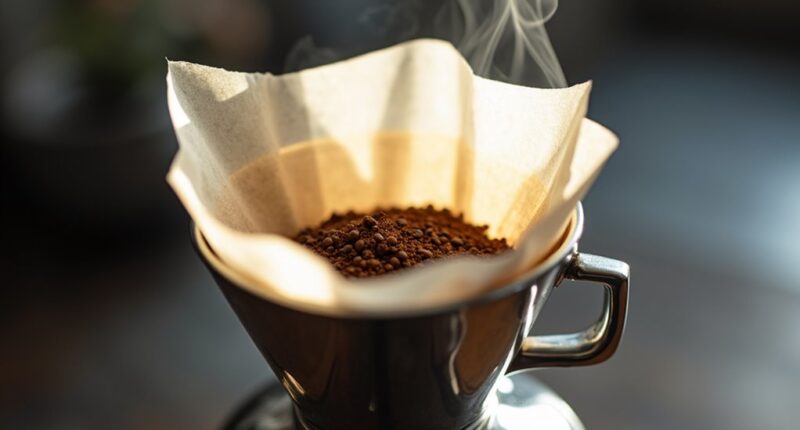A coffee filter’s like your brew’s best buddy—it keeps those pesky coffee grounds out of your cup and helps you whip up that perfect cup of joe. They come in all shapes and sizes, like paper, metal, and cloth, each giving your coffee a different vibe. Plus, using the right filter can amp up your flavor game! Curious to learn more about picking the best filter for your morning ritual? Stick around!
At a Glance
- A coffee filter is a device that separates coffee grounds from brewed coffee for a clean drinking experience.
- Filters control water flow, aiding in the extraction of flavors during brewing.
- They come in various types, including paper, metal, cloth, and synthetic materials, each impacting flavor and brew quality.
- Coffee filters help absorb bitterness and enhance the overall coffee taste while simplifying cleanup.
- Regular maintenance of coffee machines and filters ensures optimal brewing results and flavor consistency.
Function and Purpose of Coffee Filters
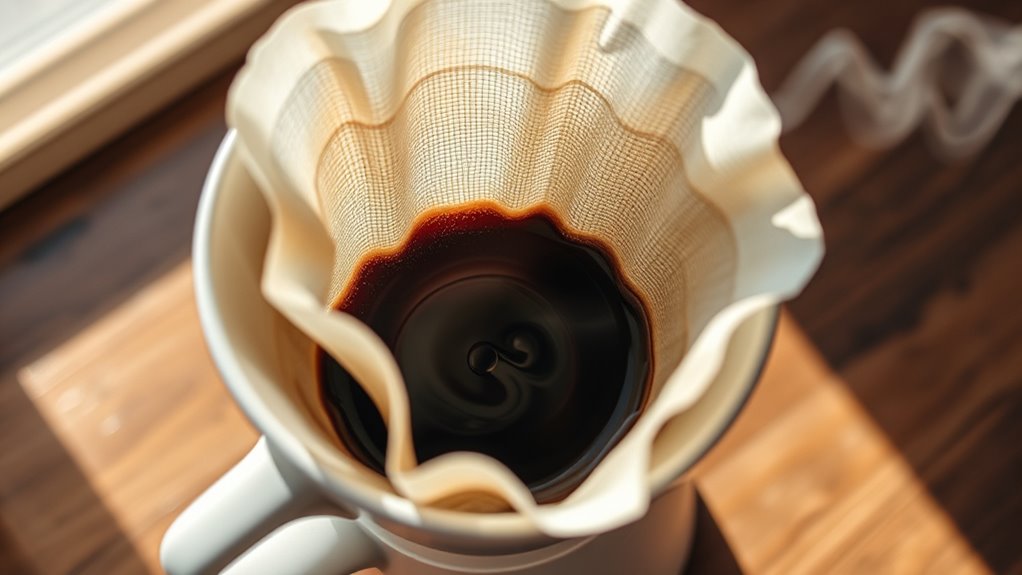
When you brew your morning coffee, you mightn’t think much about that little paper or metal filter, but trust me, it’s doing some serious work!
It keeps those pesky coffee grounds out of your cup, so you can enjoy a clean sip. Plus, it plays a big role in your brewing techniques.
By controlling water flow, it helps with flavor extraction, making your coffee taste just right. Whether you’re using a drip machine or a pour-over, that filter’s got your back! Additionally, the choice of coffee filter type can significantly influence the overall taste and quality of your brew.
Types of Coffee Filters
Have you ever wondered how many different ways there are to filter your coffee? You’ve got paper filters, which come in cute shapes and give you that clean, crisp flavor.
Then there are metal filters, perfect for those who love a fuller-bodied brew.
Metal filters deliver a robust, full-bodied coffee experience that coffee lovers will adore.
Cloth filters bring a bit of tradition to your coffee game, while permanent plastic filters are super durable but a tad less eco-friendly.
Specialty systems? They’re like the rock stars of brewing techniques, letting you control every little detail. Choosing the right filter type can significantly affect the flavor and aroma of your coffee brew.
Materials Used in Coffee Filters
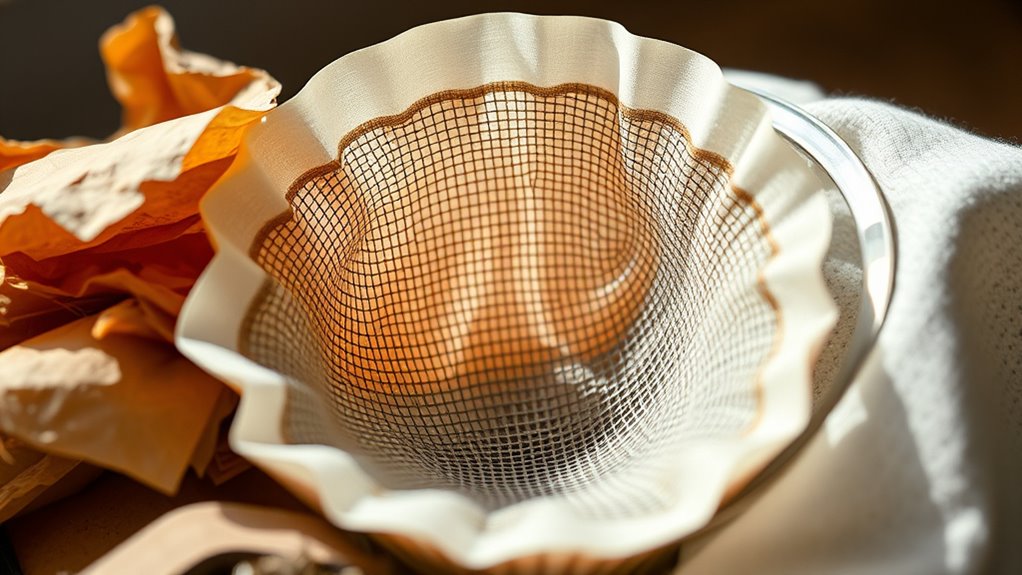
So, you’ve got your favorite type of coffee filter, but ever wondered what they’re actually made of?
Well, paper filters come from cellulose fibers, mostly wood pulp, and can be bleached or unbleached. They’re handy and biodegradable!
Metal filters, like stainless steel, are super durable and reusable, trapping grounds while letting oils flow through.
Cloth filters, made from cotton or hemp, are also reusable but need a little TLC to avoid mold.
Finally, synthetic filters, crafted from nylon, can last ages but aren’t the greenest choice. Furthermore, many coffee enthusiasts enjoy pairing their brew with non-dairy creamers, which can enhance the flavor experience.
Each type has its perks, so pick one that fits your coffee vibe!
Environmental Impact of Coffee Filters
You mightn’t think about it while sipping your morning brew, but coffee filters have a pretty big environmental footprint.
Every day, they add heaps of waste to landfills, and most are made from paper, using up precious trees and water. Plus, their production and transport release carbon emissions.
Coffee filters contribute significantly to landfill waste, consuming valuable resources and generating carbon emissions during their production and transport.
But don’t worry! You can hop on the sustainability practices train by choosing biodegradable or reusable filters. Eco-friendly coffee options are available that can significantly reduce your impact.
Think of permanent filters like a trusty friend that keeps on giving.
Benefits of Using Coffee Filters
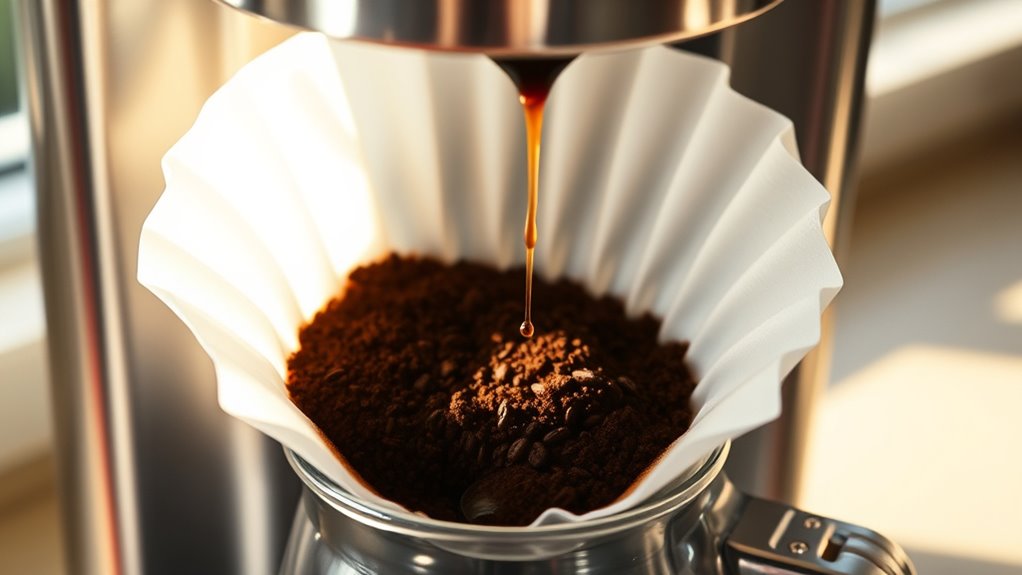
While being eco-friendly with your coffee filter choices is a great start, let’s chat about the perks of using filters in the first place!
First off, they boost filter efficiency by keeping pesky grounds out of your cup, so you enjoy a smoother sip. Plus, they absorb some of that bitterness, making coffee gentler on your stomach.
Cleanup? A breeze! Just toss the filter and you’re golden. With consistent results, you’ll impress your friends with perfect brews every time. Additionally, using the right filter can enhance coffee’s flavor profile, allowing you to fully appreciate the nuances of your favorite beans.
Impact of Filters on Coffee Taste
When it comes to brewing the perfect cup of coffee, the filter plays a starring role in the flavor game.
Ever noticed how different filter materials—like paper, metal, or cloth—can change your brew? Paper filters absorb oils, giving you a cleaner taste, while metal ones let those rich oils through, creating a bolder flavor.
Cloth filters? They balance it out nicely! Plus, the porosity of your filter affects how much coffee’s extracted, influencing body and acidity. Choosing the right filter type can greatly enhance your coffee experience.
Paper Filters: Pros and Cons
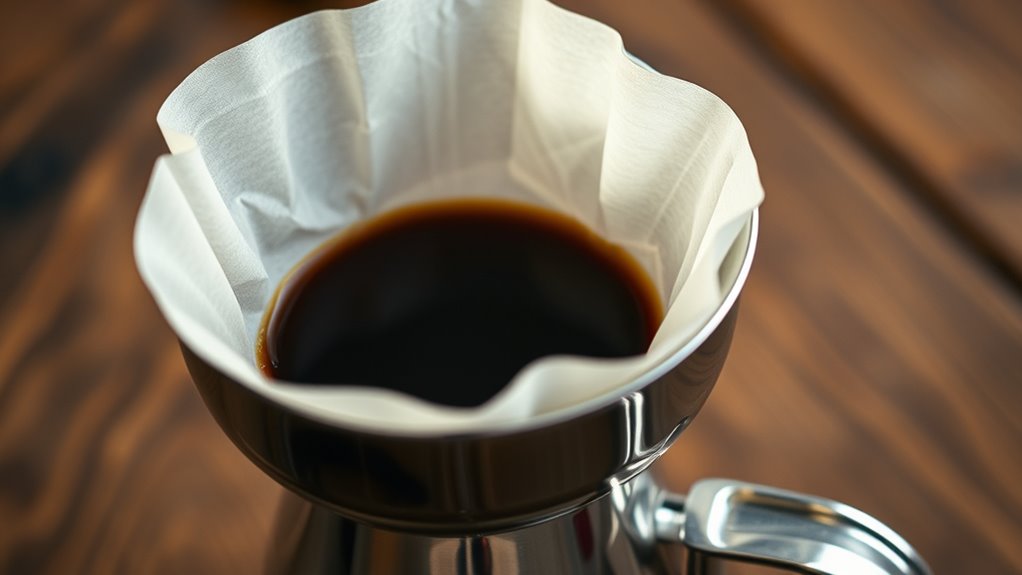
Paper filters are often a go-to for many coffee lovers, and it’s easy to see why! They trap fine grounds and oils, giving you a cleaner brew—definitely a paper filter advantage.
Plus, they’re super convenient since you can toss them out after use.
They’re incredibly handy—just brew your coffee and toss the filter away!
But let’s be honest, they do have some paper filter disadvantages. You might find yourself buying them constantly, and that adds up!
Plus, if you’re not careful, they can tear. And don’t forget about the environmental impact; single-use means more waste.
Still, if you love a smooth cup of coffee, these filters are hard to beat! Additionally, regular cleaning of your coffee maker with vinegar cleaning tips can enhance the flavor of your brew and prolong the life of your machine.
Metal Filters: Advantages and Disadvantages
If you’re looking to elevate your coffee game, metal filters might just be the secret weapon you didn’t know you needed!
They come with a few metal filter benefits, but there are some metal filter drawbacks too. Here’s what to take into account:
- Keeps those delicious coffee oils for a fuller flavor.
- Reduces waste since you can reuse them.
- Can be a bit tricky to clean, so regular maintenance is key.
- Metal filters can also provide a consistent grind size that enhances flavor extraction from the coffee beans.
Reusable vs. Disposable Filters
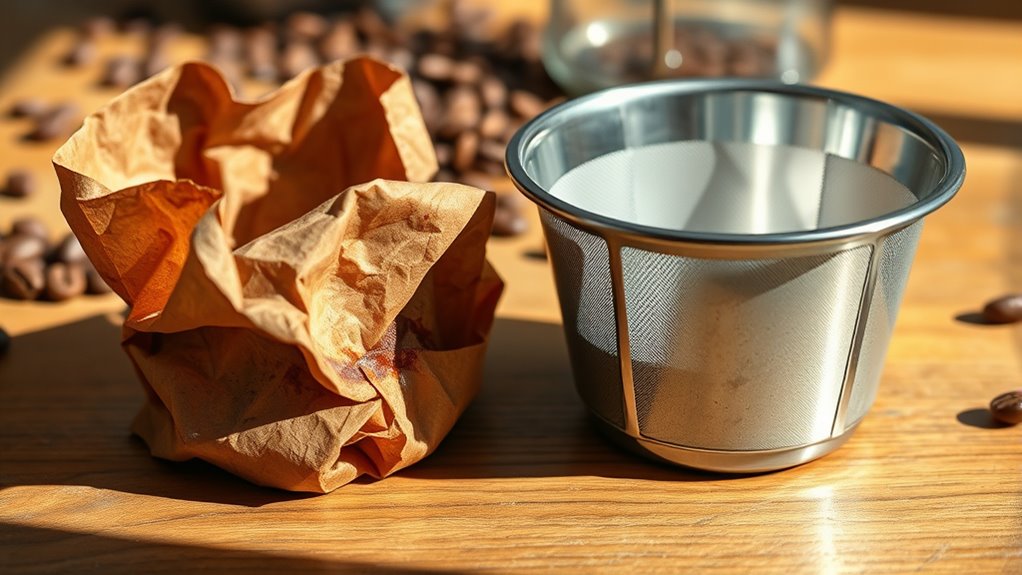
Choosing between reusable and disposable coffee filters can feel like a big deal, but don’t worry, you’re not alone!
Reusable filters offer some great benefits, like cutting down on paper waste and saving you cash over time. Think of all those trees saved!
But, let’s be real—there are some disposable drawbacks. Those single-use filters can pile up in landfills, and who wants to contribute to that? Plus, they might give your brew a cleaner taste. Additionally, many disposable filters are made from BPA-free materials, ensuring that your coffee is not only delicious but also safe from harmful chemicals.
Choosing the Right Coffee Filter for Your Brew
When it comes to brewing the perfect cup of coffee, picking the right filter can make all the difference! Your choice impacts flavor and brewing consistency, so here’s what to take into account:
- Filter size: Match it to your brewer—#2, #4, or specialty shapes.
- Material: Paper for a clean taste, metal for richness, or cloth for balance.
- Brewing method: Cone filters shine in pour-over, while basket filters fit drip machines.
Experiment a little, and you’ll find your sweet spot. Additionally, using the right water for coffee can enhance the overall flavor profile of your brew.
Trust me, the right filter will have you sipping like a pro in no time!
